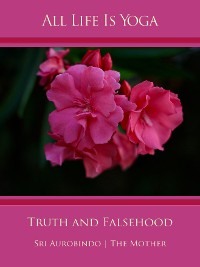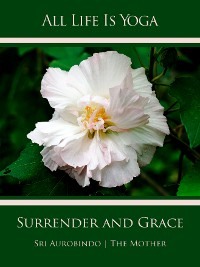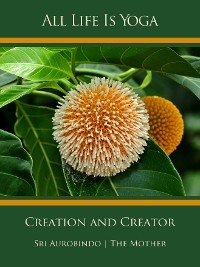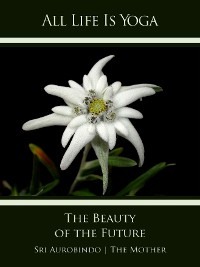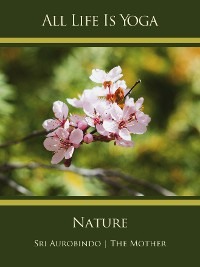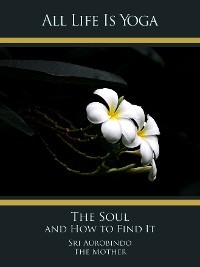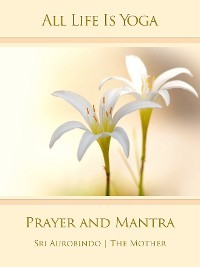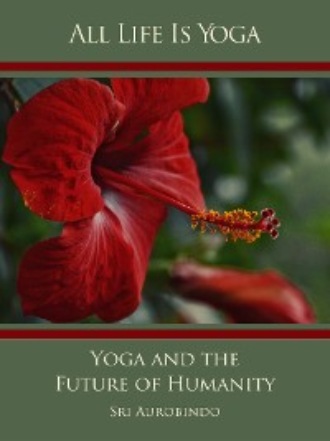
Полная версия
All Life Is Yoga: Yoga and the Future of Humanity
* * *
Chapter 4
The Fullness of Yoga – In Condition
We are to exceed our human stature and become divine; but if we are to do this, we must first get God; for the human ego is the lower imperfect term of our being, God is the higher perfect term. He is the possessor of our supernature and without His permission there can be no effectual rising. The finite cannot become infinite unless it perceives its own secret infinity and is drawn by it or towards it; nor can the symbol-being, unless it glimpses, loves and pursues the Real-being in itself, overcome by its own strength the limits of its apparent nature. It is a particular becoming and is fixed in the nature of the symbol that it has become; only the touch of that which is all becomings and exceeds all becomings, can liberate it from the bondage to its own limited Nature. God is That which is the All and which exceeds the All. It is therefore only the knowledge, love and possession of God that can make us free. He who is transcendent, can alone enable us to transcend ourselves; He who is universal can alone enlarge us from our limited particular existence.
In this necessity is the justification of that great and imperishable force of Nature, which Rationalism has unjustly and irrationally despised, Religion. I speak of religion, – not of a creed, church or theology, for all these things are rather forms of religiosity than essence or even always action of religion, – but of that personal and intimate religion, a thing of temper and spirit and life, not of views and formal actions, which draws a man passionately and absorbingly to his own vision of the Supreme or his own idea of something higher than himself which he must follow or become. Without a fervent worship of the Supreme in the heart, a strong aspiration upwards to It in the will or a vehement thirst for it in the temperament, we cannot have the impulse to be other than ourselves or the force to do anything so difficult as the transcending of our own ingrained and possessing human nature. The prophets have spoken and the Avatars have descended always for the one purpose, to call us to God, to inspire us to this great call on our upward straining energies or else to prepare something in the world which will help to bring humanity nearer to the goal of its difficult ascending journey.
It may seem at first sight that there is no need for these religious terms or this religious spirit. If the aim is to become something superior to man, to evolve a superman out of ourselves, as man has been evolved out of the ape, – if that statement of the progression be indeed the truth, – the ape out of inferior animal forms, they again out of mollusc and protoplasm, jellyfish or vegetable animals, and so to the end of the series, then what need is there of anything but the training, preferably the most intelligent and scientific training of our mental, moral and physical energies till they reach a point when they are transmuted by the psychical chemistry of Nature into the coming superior type? But the problem is not so simple, in reality. There are three errors hidden at the basis of this sceptical question. We mistake the nature of the operation to be effected, we mistake the nature of the power and process that works it out, we mistake the nature of the thing that uses the power and works out the process.
Nature does not propose to man to work out a higher mental, moral and physical variation-type in the mould of the present human being, – the symbol we are; it proposes to break that general type altogether in order to advance to a new symbol-being which shall be supernatural to present man as present man is to the animal below him. It is doubtful whether in the pure human mould Nature can go much farther than she has gone at present; that she can for instance produce a higher mental type than Newton, Shakespeare, Caesar or Napoleon, a higher moral type than Buddha, Christ or St Francis, a higher physical type than the Greek athlete or to give modern examples, a Sandow or a Ramamurti. She may seek to bring about a better combination of mental and moral, or of moral, mental and physical energies; but is she likely to produce anything much above the level of Confucius or Socrates? It is more probable and seems to be true that Nature seeks in this field to generalise a higher level and a better combination. Neither need we believe that, even here, her object is to bring all men to the same level; for that can only be done by levelling downwards. Nothing in Nature is free from inequalities except the forms that are the lowest and least developed. The higher the effort accomplished, the more richly endowed the organism of the species, the greater the chances of inequality. In so high and developed a natural movement as Man, equality of individual opportunity is conceivable, equality of natural powers and accomplishment is a chimera. Nor will the generalisation of powers or the increase of material make any difference to the level of natural attainment. All the accumulated discoveries and varied information of the modern scientist will not make him mentally the superior of Aristotle or Socrates; he is neither an acuter mind nor a greater mental force. All the varied activities of modern philanthropy will not produce a greater moral type than Buddha or St Francis. The invention of the motor car will not make up for the lost swiftness and endurance nor gymnastics restore the physical capacity of the Negro or the American Indian. We see therefore the limits of Nature‘s possibilities in the human symbol, fixed by the character of the symbol itself and recognised by her in her strivings.
It is still a question whether in these limits the chief preoccupation of Nature is the exhaustion of the possibilities of the human symbol. That is rather man‘s preoccupation and therefore the direction she takes when human intellect interferes with her normal progression. Left to herself and even utilising human interferences, she seems bent rather on breaking the mould, than on perfecting it, – only indeed in her more advanced individuals and more daring movements and with due regard to the safety of the general human type, but this is always her method when she wishes to advance to a fresh symbol without destroying the anterior species. The more civilised man becomes, the more she plagues him with moral abnormalities, excesses of vice and virtue and confusions of the very type of vice and virtue; the more he intellectualises, the more he insists on rationality as his utmost bourne, the more she becomes dissatisfied and clamours to him to develop rather his instincts and his intuitions; the more he strives after health and hygiene, the more she multiplies diseases and insanities of mind and body. He has triumphed over supernaturalism, he has chained her down to the material, human and rational; immediately she breaks out fiercely into unthought-of revivals and gigantic supernaturalisms. Whatever work she is intent on, she will not be baulked in that work by the limited human reason. Through all her vast being she feels the pulsation of a supernatural power, the workings and strivings of a knowledge superior to material reason. She breaks out, therefore, she compels, she insists. Everywhere we see her striving to break the mental, moral and physical type she has created and to get beyond it to some new processes as yet not clearly discerned. She attacks deliberately the sound healthfulness and equilibrium of our normal type of intellectuality, morality and physical being. She is stricken also with a mania of colossalism; colossal structures, colossal combinations, colossal heights and speeds, colossal dreams and ambitions outline themselves everywhere more or less clearly, more or less dimly. Unable as yet to do her will in the individual, she works with masses; unable in the mind, with material forms and inventions; unable in actualities, with hopes and dreams; unable to reproduce or produce Napoleons and super-Napoleons, she generalises a greater reach of human capacity from which they may hereafter emerge more easily, and meanwhile she creates instead Dreadnoughts and Super-dreadnoughts, Trusts and mammoth combines, teems with distance destroying inventions and seems eager and furious to trample to pieces the limitations of space and time she herself has created.
As if to point her finger to the thing she intends, she has accumulated the signs of this process of breaking and rebuilding in the phenomena of genius. It is now common knowledge that genius hardly appears in the human species unattended, unprepared or unaccompanied by abnormalities in the individual body, vitality and mind which contains it, – degeneration, insanity or freak in the heredity which produces it and even disturbance and supranormality in the human environment in which it occurs. The haste of a brilliant generalisation establishes on this basis the paradox that genius itself is a morbid phenomenon of insanity or degeneration. The true explanation is sufficiently clear. In order to establish genius in the human system, Nature is compelled to disturb and partially break the normality of that system, because she is introducing into it an element that is alien as it is superior to the type which it enriches. Genius is not the perfect evolution of that new and divine element; it is only a beginning or at the highest an approximation in certain directions. It works fitfully and uncertainly in the midst of an enormous mass of somewhat disordered human mentality, vital nervosity, physical animality. The thing itself is divine, it is only the undivine mould in which it works that is to a lesser or greater extent broken and ploughed up by the unassimilated force that works in it. Sometimes there is an element in the divine intruder which lays its hand on the mould and sustains it, so that it does not break at all, nor is flawed; or if there is a disturbance, it is slight and negligible. Such an element there was in Caesar, in Shakespeare, in Goethe. Sometimes also a force appears to which we can no longer apply the description of genius without being hopelessly inadequate in our terminology. Then those who have eyes to see, bow down and confess the Avatar. For it is often the work of the Avatar to typify already, partly or on the whole, what Nature has not yet effected in the mass or even in the individual, so that his passing may stamp it on the material ether in which we live.
But what is this type of which the great Mother is in labour? What birth will emerge from the cries and throes of this prolonged and mighty pregnancy? A greater type of humanity, it may be said. But in order to understand what we are saying, we must first see clearly what the humanity is which she seeks to surpass. This human symbol, this type we now are is a mental being with a mental ego, working in a vital case by mind always, but upon matter, in matter and through matter. It is limited in its higher workings by its lower instruments. Its basis of mind is egoistic, sensational and determined by experience and environment, its knowledge therefore pursues wider or narrower circles in a fixed and meagre range. Its moral temperament and action is similarly egoistic, sensational, experiential and determined by environment; for this reason it is bound equally to sin and virtue and all attempts radically to moralise the race within the limits of its egoistic nature have been and must necessarily, in spite of particular modifications, end in general failure. It is not only a mixed but a confused type, body and vitality interfering with mind and mind both hampered by and hampering body and vitality. Its search for knowledge, founded on sense contact, is a groping like that of a man finding his way in a forest at night; it makes acquaintance with its surroundings by touching, dashing on or stumbling over them; and, although it has an uncertain light of reason given it which partially corrects this disability, yet since reason has also to start from the senses which are consistent falsifiers of values, rational knowledge is not only restricted but pursued by vast dimnesses and uncertainties even in that which it seems to itself to have grasped. It secures a few flowers of truth by rummaging in a thorny hedge of doubts and errors. The actions of the type also are a breaking through thickets, a sanguine yet tormented stumbling forward through eager failures to partial and temporary successes. Immensely superior to all else that Nature had yet effected, this type is yet so burdened with disabilities, that, if it were impossible to break its mould and go forward, there would be much justification for those pessimistic philosophies which despair of Life and see in the Will not to Live humanity‘s only door of escape admitting to it no other salvation. But Nature is the will of the all-Wise God and she is not working out a reduction of the world to absurdity. She knows her goal, she knows that man as he is at present is only a transitional type; and so far as she can consistently with the survival of the type, she presses forward to what she has seen in God‘s eternal knowledge as standing beyond. From this ego, she moves towards a universal consciousness, from this limitation to a free movement in infinity, from this twilit and groping mind to the direct sunlit vision of things, from this conflict without issue between vice and virtue to a walking that keeps spontaneously to a God-appointed path, from this broken and grief-besieged action to a joyous and free activity, from this confused strife of our members to a purified, unentangled and harmonious combination, from this materialised mentality to an idealised and illuminated life, body and mind, from the symbol to reality, from man separated from God to man in God and God in man. In brief, as she has aspired successfully from matter to life, from life to mind and mental ego, so she aspires and with a fated success to an element beyond mind, the vijnana of the Hindus, the self-luminous idea or Truth-self now concealed and superconscious in man and the world, as life was always concealed in matter and mind in life. What this vijnana is, we have yet to see, but through it she knows she can lay firm hold on that highest term of all which is the reality of all symbols, in Spirit, in Sachchidananda.
The aim of Nature is also the aim of Yoga. Yoga, like Nature at its summit, seeks to break this mould of ego, this mould of mentalised life body and materialised mind, in order to achieve ideal action, ideal truth and infinite freedom in our spiritual being. To effect so enormous an end great and dangerous processes have to be used. Those who have been eager on this road or have opened up new paths towards the goal, have had to affront as a possibility frequently realised loss of reason, loss of life and health or dissolution of the moral being. They are not to be pitied or scorned even when they succumb; rather are they martyrs for humanity‘s progress, far more than the lost navigator or the scientist slain by the dangers of his investigation. They prepare consciently the highest possible achievement towards which the rest of humanity instinctively and unconsciously moves. We may even say that Yoga is the appointed means Nature holds in reserve for the accomplishment of her end, when she has finished her long labour of evolving at least a part of humanity temperamentally equal to the effort and intellectually, morally and physically prepared for success. Nature moves toward supernature, Yoga moves towards God; the world-impulse and the human aspiration are one movement and the same journey.
* * *
Chapter 5
The Conditions for Integral Fulfilment
The attainment of God is the true object of all human effort for which all his other efforts political, social, literary, intellectual, are only a necessary condition and preparation of the race; but then there are both differences in the state of the attainment, differences in its range and effectivity. Three states of divine attainment may usefully be distinguished, touch with God, indwelling in Him and becoming He. The first is initial and elementary; unless passing the veil of our ordinary nature we touch the divine Being or He leaning down impose His touch on us, unless we come first into contact with Him either in our heart, our mind, our works or our being, we cannot go on to indwell in Him. If we are strong in spirit, the touch may indeed be rapid and summary and we may wake at once and stride forward to the state of divine indwelling, soul of man in the soul of God, the individual in the universal; but the touch must be there. To enforce this preliminary step, to bring man into some kind of contact with God, is the common and sometimes the sole preoccupation of human religions. It does not matter greatly to Nature for her purpose how it is done, – in however crude and elementary a way, through whatever intellectual errors and emotional blunders or ethical outrages, the touch must be established; this imperatively and above all things the religious spirit demands. Nature, as is always her way, presses on to her all-important, immediate steps and is willing to purchase a single great and general gain by any number of particular losses. Man, besides, is so various in the arrangement of his human qualities, the master spring as well as the peculiar temperament differs so greatly or so subtly in each individual that there can never be, for this purpose of Nature’s, too many sects, disciplines or different religions. Swami Vivekananda has well seen the consummation of religion in a state when each human individual has his own religion dictated by his own spiritual needs and nature; for collective creeds, Churches and theologies, in spite of their temporary necessity and some undeniable permanent advantages, help to formalise the upward effort and deprive it of its adaptability, freedom and perfect individual sincerity. The priest and dogma will seldom leave God and the soul free to meet each other in that solitude and spontaneity which gives the union its highest force and delight. They are always pressing in to control and preside at the marriage and legitimise it with formulas, rites and official registration.
Moreover the intellect of natural man is narrow, his effort soon exhausted and easily satisfied with imperfection. If he is led to think that his way of contact with the Divine is the only way, his own freedom of higher development is fettered or entirely taken away from him and in his intellectual and religious egoism he militates against the freedom of others. Most religions tend easily to believe that the contact with God once established, no matter with what limitations or of what kind, all is done that needs to be done, all fulfilled that God demands of us. Popular religions tend naturally to be dualistic and to preserve a trenchant distinction between man and God dividing the symbol being from That which expresses itself in him; while with one hand they raise man towards his super-nature, with the other they hold him down to his ordinary nature. The lower is suffused with the glow of the higher and touched with its power and rapture, but it does not itself rise into and dwell within it. At its lowest the dualistic soul cherishes the taint of its imperfections, at its highest, unless in rare self-transcending moments, keeps itself distinct in awe and reverence from the divine Lover, worships at His feet but cannot hide itself in His bosom.
Therefore Nature, still following her upward surge, has provided a mightier rank of human souls who are capable of going forward beyond this preliminary effort and having entered into the very being of God, of dwelling there in beatitude. Entering into the consciousness of the Infinite, feeling it all around them and in them, ever thrilling with its touch, aware of identity with It in nature, joy and inner awareness, they yet preserve a constant separateness of their special being in that identity. They do not plunge themselves wholly into the divine ocean or, if they go down into it, they keep hold on a fathomline which will preserve their touch with the surface. In their nature – whatever be their opinions – such men are Visishtadwaitins, souls not drawn towards entire oneness. But unless man plunges himself wholly into God caring not whether he re-emerge, unless the human sacrifices himself wholly to the divinity, keeping back no particle of his being, not even the least particle of separateness of the individual ego, jivatman, the divine purpose in man cannot be utterly accomplished. Therefore Nature or the Will of God – for Nature is nothing but the Will of God in action – has provided that some, having indwelt in God, human soul in divine soul, shall be irresistibly called immediately, with brief respite or at long and last to the utter immersion. These go onward and throw away the last trace of Ego into God. Some of us, it has been said by a great teacher, are jivakotis, human beings leaning so pre-eminently to the symbol-nature that, if they have lost it utterly for a while in the Reality, they lose themselves; once immersed, they cannot return; they are lost in God to humanity; others are ishwarakotis, human beings whose centre has already been shifted upwards or, elevated in the superior planes of our conscious-existence from the beginning, was established in God rather than in Nature. Such men are already leaning down from God to Nature; they, therefore, even in losing themselves in Him yet keep themselves since in reaching God they do not depart from their centre but rather go towards it; arrived they are able to lean down again to humanity. Those who can thus emerge from this bath of God are the final helpers of humanity and are chosen by God and Nature to prepare the type of supernatural man to which our humanity is rising.
There are, then, these three divine conditions, states separately conceived of humanity’s God attainment. Man being limited in energy and discriminative rather than catholic in intellect, fastens usually on this separate conception and limits himself to one or other of these conditions; Yogic method, also, being careful of the different natures of men, suits itself to their limitations, becomes selective and concentrates upon one of these conditions or another. Or even it becomes partial as well as selective; for in its contact with God, it relates itself to a part of divine quality rather than the perfect divinity, to a God of mercy, the God of Justice, the Divine Master, the Divine Friend, or else with some aspect of divine impersonal being, to Infinite Rapture, to Infinite Force or to Infinite Calm and Purity. In the indwelling there may be the same limitations, in the becoming also they may persist. There is no fault to be found with this selective process or with this partiality. They are necessary; human limitations demand this device; human perfectibility itself finds its account in these concessions. Nature knows her task and she proceeds to it with a wide, flexible and perfect wisdom which smiles at our impatient logical narrownesses and rigid, one-sighted consistencies. She knows she has an infinitely complex and variable material to deal with and must be infinitely complex and variable in her methods. We only consider precise method and ultimate fulfilment; she has to reckon on her way with thousand-armed struggles and infinite possibilities.
Nevertheless, her ultimate aim and the perfect and comprehensive Yoga is that which embraces rather than selects. We are meant to be within the symbol of humanity what God is in Himself and universally. Now God is free, absolute from these limitations and all-comprehensive. He is always one in his being, yet both one with and separate from his symbols and in that differentiated oneness able to stand quite apart from them. So we too in our ultimate divine realisation when we have become one with our divine Self, may and should be able also to stand out as the self still one in all things and beings, yet differentiated in the symbol, so as to enjoy a blissful divided closeness such as that of the Lover and Beloved mingling yet separate in their rapture; and may and should even be able to stand away from God with a sort of entire separateness holding His hand still, unlike the pure dualist, but still standing away from Him so that we may enjoy that infinity of human relation with God which is the wonder and beauty and joy of dualistic religions. To accomplish this is the full, the purna Yoga, and the sadhak who can attain to it, is in his condition the complete Yogin.



